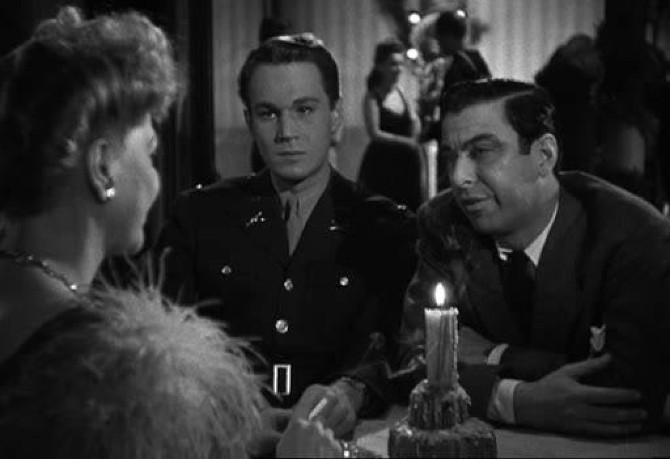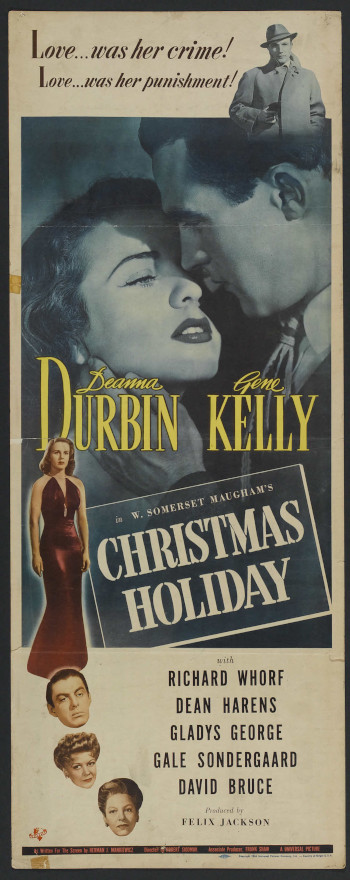If you’ve delved into the world of film noir, you’ve likely seen a number of unusual ones. . . some may be set in other countries, or in a winter wonderland (a far cry from the expected asphalt jungle that is Los Angeles), even a nuclear bomb can be found in a mid 50s example. . . yet one set during the holiday season? That’s right, 1944’s Christmas Holiday, directed by the great Robert Siodmak (Phantom Lady; Criss Cross), might mislead a few with its title (but more on that later).
A vehicle for two very unexpected stars for this type of picture, Deanna Durbin (a name perhaps less known today), was a child actor turned girl next door who is often credited with helping save Universal Studios during the Great Depression. Close to bankruptcy, the teenage star took the world by storm, her musical numbers a massive draw in features like Three Smart Girls (at the age of only 14) and One Hundred Men and a Girl, it all leading to an Academy Juvenile Award in 1938. Her first role in which she attempted to break out of this child-like ingenue typecasting, you might be able to guess that there were many who were shocked and unimpressed by this new Durbin. Opposite her was Mr. Singin’ in the Rain himself, Gene Kelly, playing against type (by today’s standards), much like his female co-star.
Less a Christmas Holiday and more of a Christmas Leave from the military, Lt. Charles Mason (Dean Harens) has had his heart broken by the love of his life. . . his fiancée marrying another bloke just a few short days before he was to return for their own ceremony. Deciding to return to San Francisco nonetheless (whether for revenge or pleading we do not know), nasty weather forces the airplane he is taking to land in New Orleans.
A bundle of sorrowful frustration, he bumps into fast talking, shady journalist Simon Fenimore (Richard Whorf). . . a man who rolls in the wrong circles, but has a surprisingly kind heart. Trying to help the guy forget his woes, he takes him to a bustling (and perhaps sketchy) nightclub – the singer on stage, Jackie Lamont (Durbin), a young woman wearing a little black dress and looking equally as sullen as our supposed lead.
Latching on to the military man (a prime example of misery loving company), they head to midnight Christmas mass, where she breaks down. With nowhere to go, Mason invites her to sleep in the living area of his hotel room, where she finally reveals her sordid story.
Her stage moniker hiding her given name of Abigail Manette, she is still married to murderer Robert Manette (Kelly) – who finds himself behind bars for life. Flashing back and transporting the story away from the Lt. and to the real narrative (an intriguing and somewhat unexpected plot device), we are now entrenched in the wooing found in a burgeoning relationship.
It is really no surprise that the young woman falls for Manette. . . all charming fun and boyish grin, the only warning, a small scar on his left cheek that disrupts seeming perfection. From a renowned, wealthy family that is slowly losing its grasp on power, you can see why – Manette a warped man, his name and status making him believe that he can endlessly gamble, using only his charm to get out of any sticky situation. Being quite up front with this woman, he takes her to his ‘supposed’ past life – a smoky nightclub where she first meets wily Fenimore. . . and later introduces her to his domineering mother (Gale Sondergaard) – who gives them her blessing.
Living with the mother in the family home, everything takes a turn when Manette returns late one night, as charming as ever, yet with some bizarre stains on his pants and quite the wad of money. Resetting back to present time to remind us of our place, another flashback continues the story, only for everything to lead to a climax that will intertwine everything together in a rather neat way.
A film noir fused with a melodrama, both stars easily accomplish playing against type, Durbin as somber as the night, still in love and not able to let her past go. She is heartbreaking, tragic, and ultimately sympathetic – a noir dame not for her trickery, but rather for her absolute beholden nature to her vile husband. Kelly, the effervescent phony charmer, so engrossed in his own pathological lies that he believes them. . . is endlessly protected by Sondergaard’s Mrs. Manette, willing to go to the ends of the Earth to feed his ego and hide his every misstep. Anyone who knows the theories of Sigmund Freud will immediately spot a prime example of an Oedipus complex. . . a most distorted relationship between mother and son.
Matched by Siodmak’s stylish directing, he really creates his own unique pace for the movie. Much slower than your average noir, certain scenes may have you questioning why it is lingering. . . only to pay off in the end. For instance, the church sequence at first seems to drag, only for us to realize that this is a vehicle for the nightclub singer to break down, her vulnerability finally seeping out of her guarded mask that has ultimately cracked – a heartbreakingly beautiful example of building drama. Another sample of Siodmak’s fantastical camera work finds a lengthy single take transporting us over three floors in an upscale restaurant – each second ensconcing us within Manette’s wooing of the young woman, an example of his oversized persona misleading her every step of the way.
A huge success at the box office (likely everyone wanted to see Durbin’s new dramatic turn), Christmas Holiday is a bizarre little noir that, despite its title (in the end, Christmas is simply a vehicle for the Lt. to leave camp and the holiday is non-existent), is a unique treat. Though it might not bring the expected pacing, femme fatales, or other more traditional noir themes, its fusion of crime and drama elements make for some enthralling viewing as well as interesting insights on love and loss. So, break out this little known, loosely-named Christmas noir, it’s a shot well worth taking.



